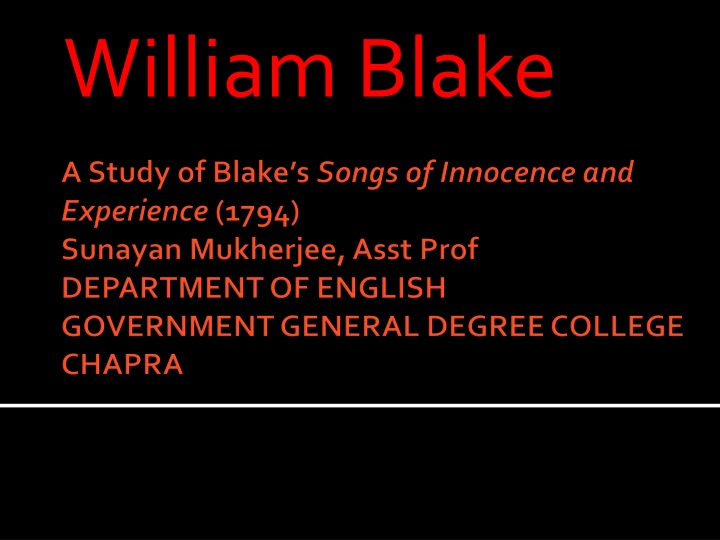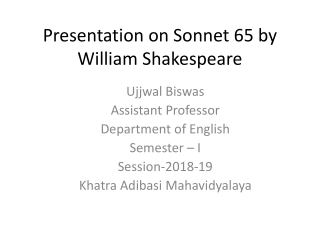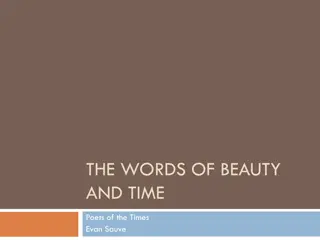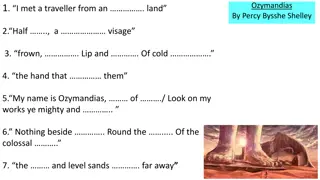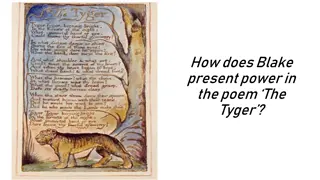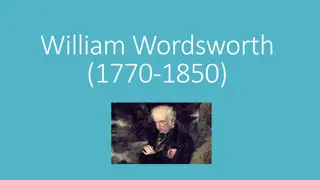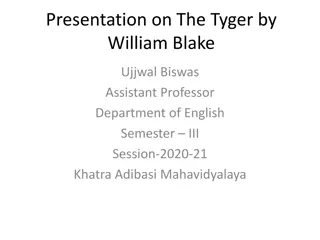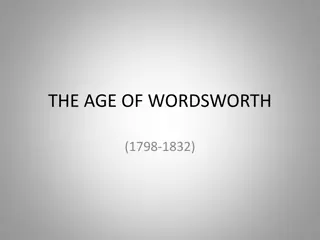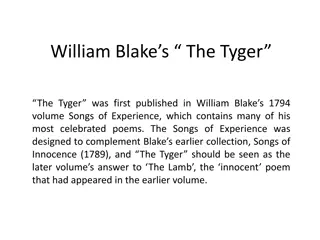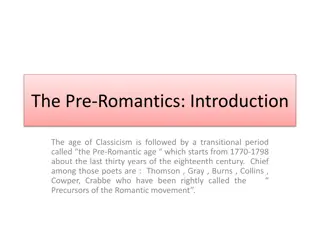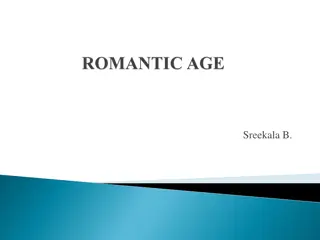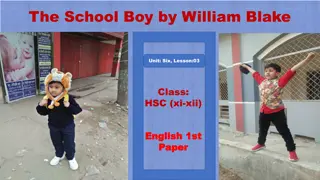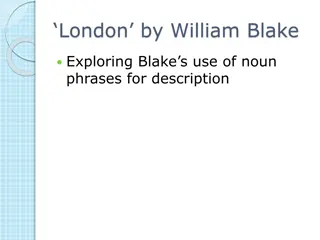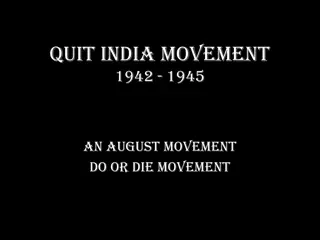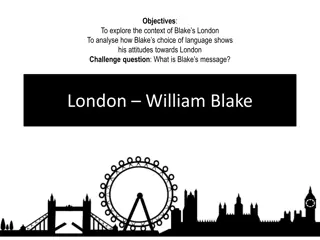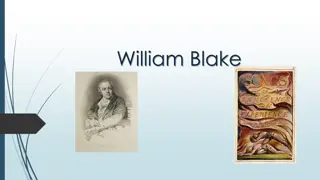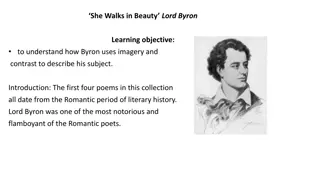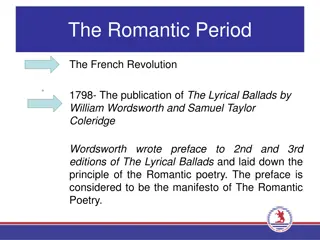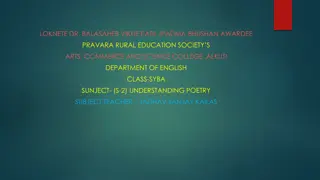William Blake: Visionary Artist and Poet of the Romantic Movement
William Blake, an iconic figure in the Romantic Movement, was a visionary artist and poet known for works like "Songs of Innocence" and "Songs of Experience." His imaginative and prophetic books reflected a break from the Enlightenment philosophy, emphasizing emotion over rationality. Inspired by the French Revolution, Blake's art depicted a world of beauty, equality, and liberty, driven by the power of imagination.
Download Presentation

Please find below an Image/Link to download the presentation.
The content on the website is provided AS IS for your information and personal use only. It may not be sold, licensed, or shared on other websites without obtaining consent from the author.If you encounter any issues during the download, it is possible that the publisher has removed the file from their server.
You are allowed to download the files provided on this website for personal or commercial use, subject to the condition that they are used lawfully. All files are the property of their respective owners.
The content on the website is provided AS IS for your information and personal use only. It may not be sold, licensed, or shared on other websites without obtaining consent from the author.
E N D
Presentation Transcript
Songs of Innocence (1789) Songs of Experience (1794) The Marriage of Heaven and Hell (1790) Visions of the Daughters of Albion (1793) The Book of Urizen (1794) The Book of Los (1795)
To see a World in a Grain of Sand And a Heaven in a Wild Flower, Hold Infinity in the palm of your hand And Eternity in an hour. William Blake, Auguries of Innocence Theidea of Imagination Blake as a visionary and his prophetic books
Imagination is that supreme ability exercised by poets and artists, to make a better world for themselves, which is inspired by the real world, but unlike the real world, it is more beautiful, perfect and has no place for anxieties, sorrows and pain. Imagination is a quality that only artists possess. It is a way of seeing the world in its ideal state that helps to transform ordinary as extraordinary. It is that inward eye of the individual I , that helps to paint a different version of reality altogether. All art is inspired by Imagination.
Reaction against Enlightenment Philosophy- Break from Neo- Classical Tradition of order and rationality to give precedence to feeling or emotions . French Revolution and its search for Liberty, Equality and Fraternity. Reaction against Industrial Revolution. Romantic sensibility espoused the individual over the society .
The impact of French Revolution was massive in ushering the Romantic Movement. The French Revolution which took place in the year 1789 saw for the first time the dethronement of monarchy and the establishment of a democratic form of government. It was the rule by the people. The French thinkers, Rousseau, Montesquieu, and Voltaire were inspirational behind this revolution who had sought for establishing the cause of Liberty, Equality and Fraternity in society. It was the search for an egalitarian form of government where everyone will be recognized as equal. The Romantics were deeply moved by such an ideal.
I must create a System or be enslaved by another Man s said William Blake, one of the precursor to the Romantics. The Romantic Movement was a reaction against the Neo- Classical writers like Pope, Dryden who tried to imitate the Classical writers viz Virgil, Horace etc to create finest poetry. They wanted to express in free verse rather than following a specific verse pattern. Poems would be simple, the subject matter would be easy to relate and the language used will be that of common man.
The Industrial Revolution saw the growing rise of industries. The machines soon started to dictate over the lives of people. Mornings started with men lining in front of the factories. At the evening they would once again slowly plod their way back towards home, weary and exhausted. Life became mechanical, bound by the sirens of the factory system. The free energy, life force was somewhere becoming to get restricted. The Romantics gave the call of return to Nature. For Blake nature symbolized that innocent state of joy and bliss, a childlike state of existence, far away from the complexities of adult life.
Blake was considered as a Pre- Romantic poet as he had brought in the sensibility of English Romantic thought much before Wordsworth published his Lyrical Ballads in 1798. Blake s poetic philosophy was rooted in the idea of binaries or contraries, viz the idea of Innocence and Experience. This idea of contraries was later found in the work of another important Romantic poet- Samuel Taylor Coleridge.
Blake was a mythopoeic poet (one who has created his own world of myth) and in his visionary world we find four important characters- Urizen (depicted as an old, bearded man who symbolizes the use of REASON and AUTHORITY), Los (also known as the Divine Blacksmith, a symbol of free spirit and Imagination), Luvah (Hope) and Tharmuz ( Freedom). In Blakean world, Urizen and Los are in constant struggle with one another. Urizen tries to curb the free spirit of Man with its rationality and Los is the champion of Imagination. Together this forms a part of Blake s Four Zoas.
Blake believed that contraries or duality are part of creation. The Romantics rejected any sort of absolute vision of good and evil , black and white . Only a rationalist can think in such categories of thought. To a visionary, one who looks with the eye of imagination, there s nothing absolutely good or absolutely evil. Rather the world exists as a fine balance. Blake talks about this as a spiritual journey from the world of Innocence to Experience.
Innocence according to Blake is that childlike vision of existence, which is similar to that state of absolute naivety, purity, bliss and happiness which a child enjoys. It is that similar state of being close to God, where the belief in Man, nature, society is firmly intact. Innocence is a stage experienced by every one of us before we step into the world of adulthood and our vision gets corrupted. Songs of Innocence is a collection of poems depicting such scenes of joy and bliss, a kind of pristine charm adheres to the poems.
Piping down the valleys wild, Piping songs of pleasant glee, On a cloud I saw a child, And he laughing said to me: Pipe a song about a Lamb! So I piped with merry cheer. Piper, pipe that song again; So I piped: he wept to hear. Drop thy pipe, thy happy pipe; Sing thy songs of happy cheer! So I sung the same again, While he wept with joy to hear. Piper, sit thee down and write In a book that all may read. So he vanished from my sight; And I plucked a hollow reed, And I made a rural pen, And I stained the water clear, And I wrote my happy songs Every child may joy to hear.
Little lamb, who made thee? Dost thou know who made thee, Gave thee life, and bid thee feed By the stream and o er the mead; Gave thee clothing of delight, Softest clothing, woolly, bright; Gave thee such a tender voice, Making all the vales rejoice? Little lamb, who made thee? Dost thou know who made thee? Little lamb, I ll tell thee; Little lamb, I ll tell thee; He is call d by thy name, For He calls Himself a Lamb. He is meek, and He is mild, He became a little child. I a child, and thou a lamb, We are call d by his name. Little lamb, God bless thee! Little lamb, God bless thee!
And Love, the human form divine: And Peace, the human dress. Then every man, of every clime, That prays in his distress, Prays to the human form divine: Love, Mercy, Pity, Peace. And all must love the human form, In heathen, Turk, or Jew. Where Mercy, Love, and Pity dwell, There God is dwelling too. To Mercy, Pity, Peace, and Love, All pray in their distress, And to these virtues of delight Return their thankfulness. For Mercy, Pity, Peace, and Love, Is God our Father dear; And Mercy, Pity, Peace, and Love, Is man, His child and care. For Mercy has a human heart; Pity, a human face;
I have no name; I am but two days old. What shall I call thee? I happy am, Joy is my name. Sweet joy befall thee! Pretty joy! Sweet joy but two days old. Sweet joy I call thee: Thou dost smile, I sing the while; Sweet joy befall thee!
The world of darkness, oppression, cruelty where love is challenged, free spirit is thwarted and desire is repressed. The world of Experience is a negative energy, a corruption which destroys the inherent ability to imagine . Instead it enforces a kind of stricture where free spirit is curbed. Therfore Experience is a condition of pain and suffereing. Let s look at the first poem in the Songs of Experience.
Hear the voice of the Bard, Who present, past, and future, sees; Whose ears have heard The Holy Word That walked among the ancient trees; Calling the laps d soul, And weeping in the evening dew; That might control The starry pole, And fallen, fallen light renew! O Earth, O Earth, return! Arise from out the dewy grass! Night is worn, And the morn Rises from the slumbrous mass. Turn away no more; Why wilt thou turn away? The starry floor. The watery shore, Is given thee till the break of day.
Tyger, tyger, burning bright In the forests of the night, What immortal hand or eye Could frame thy fearful symmetry? In what distant deeps or skies Burnt the fire of thine eyes? On what wings dare he aspire? What the hand dare seize the fire? And what shoulder and what art Could twist the sinews of thy heart? And, when thy heart began to beat, What dread hand and what dread feet? What the hammer? what the chain? In what furnace was thy brain? What the anvil? what dread grasp Dare its deadly terrors clasp? When the stars threw down their spears And watered heaven with their tears, Did He smile His work to see? Did He who made the lamb make thee? Tyger, tyger, burning bright In the forests of the night, What immortal hand or eye Dare frame thy fearful symmetry?
And I saw it was filled with graves, And tombstones where flowers should be; And priests in black gowns were walking their rounds, And binding with briars my joys and desires. I went to the Garden of Love, And saw what I never had seen; A Chapel was built in the midst, Where I used to play on the green. And the gates of this Chapel were shut, And Thou shalt not writ over the door; So I turned to the Garden of Love That so many sweet flowers bore.
How the chimney-sweepers cry Every blackening church appals, And the hapless soldier s sigh Runs in blood down palace- walls. But most, through midnight streets I hear How the youthful harlot s curse Blasts the new-born infant s tear, And blights with plagues the marriage-hearse. I wander through each chartered street, Near where the chartered Thames does flow, A mark in every face I meet, Marks of weakness, marks of woe. In every cry of every man, In every infant s cry of fear, In every voice, in every ban, The mind-forged manacles I hear:
My mother groaned, my father wept: Into the dangerous world I leapt, Helpless, naked, piping loud, Like a fiend hid in a cloud. Struggling in my father s hands, Striving against my swaddling bands, Bound and weary, I thought best To sulk upon my mother s breast.
Without Contraries there is no Progression Attraction and Repulsion , Reason and Energy Love and Hate are Necessary to Human Existence Blake, Marriage of Heaven and Hell Experience is a Necessary Evil Jerusalem Innocence dwells with wisdom, Blake later wrote, but never with ignorance. Therefore both Innocence and Experience are necessary to witness the totality of our being and meaning. It is like the two sides of the same coin, complementing one another.
It is therefore a journey from the world of Innocence to Experience to Higher Innocence, where there will be a fusion of all binaries, all contraries, where there will be nothing absolutely good or purely evil. It is a synthesis of the polarities. It is a spiritual journey from Beulah (ignorance) to Eden( Heaven). If the doors of perception were cleansed, everything would appear to man as it is, infinite. The Marriage of Heaven and Hell
